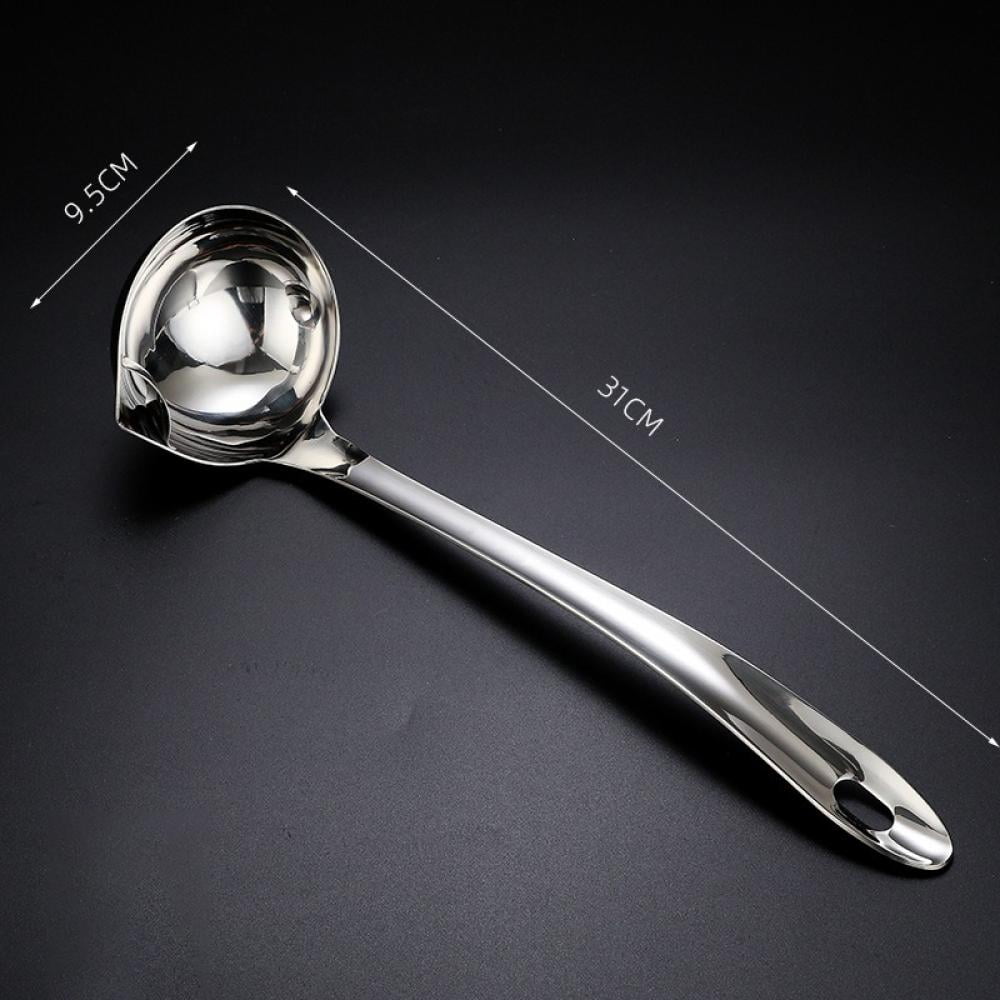what is Oil Filter Spoon
An Oil Filter Spoon is a kitchen utensil designed to help filter out excess oil, grease, or fat from cooked dishes, broths, or frying pans. It resembles a regular spoon or ladle but usually has a special design, such as a mesh, perforated bottom, or slotted surface, to allow oil to drain through while retaining solid food items.


Key Features of an Oil Filter Spoon
- Perforated or Mesh Design: The spoon has holes or a fine mesh that lets oil or grease flow through, leaving behind only the solid portions of the food. This design makes it easy to remove just the oil from dishes like soups, stews, or fried foods.
- Heat-Resistant Material: Oil filter spoons are typically made of heat-resistant materials like stainless steel or high-temperature food-grade plastic, allowing them to withstand hot oil without melting or warping.
- Ergonomic Handle: These spoons often come with a long, comfortable handle that allows for safe handling while keeping hands away from hot oil or steam.
- Multiple Sizes: Available in different sizes to accommodate various cooking needs, from removing a small amount of oil from a bowl to scooping oil out of a deep pan.
Benefits of Using an Oil Filter Spoon
- Reduces Excess Oil: By filtering out extra oil, it helps make dishes healthier and less greasy.
- Improves Texture: Removing excess oil can improve the taste and texture of certain foods, making them crispier or less heavy.
- Convenient for Frying: Perfect for deep frying, where it helps scoop out floating bits of batter or crumbs that can burn and affect the flavor of the oil.
- Easy to Clean: Most oil filter spoons are easy to clean and can be washed by hand or in the dishwasher.
- Versatile Use: Besides oil, it can be used to skim off foam, fat, or other impurities from soups, stocks, and stews.
How to Use an Oil Filter Spoon
- Position the Spoon: Place the spoon on the surface of the liquid, where oil tends to float.
- Scoop Slowly: Gently scoop to collect oil and lift it out, allowing the mesh or holes to strain out solid ingredients.
- Dispose or Reuse Oil: Pour the removed oil into a separate container if you plan to discard or reuse it.
Summary
An oil filter spoon is a handy, effective tool for healthier cooking, as it removes unwanted oil and fat from food easily. It’s especially useful for soups, stews, and fried foods, making dishes lighter without altering their flavor.
benefits of Oil Filter Spoon
The Oil Filter Spoon offers several benefits for healthier cooking, improved flavor, and convenience in the kitchen. Here are the main advantages:
1. Reduces Excess Oil for Healthier Meals
- By removing unwanted oil and grease from food, it makes dishes lighter and healthier. This is especially helpful for those aiming to reduce calorie intake or limit fat consumption.
2. Enhances Food Texture and Flavor
- Removing extra oil helps to improve the texture and flavor of dishes. It can make fried foods crisper, soups less oily, and stews lighter, giving the dish a cleaner taste and more appealing presentation.
3. Prevents Overly Greasy Foods
- Using an oil filter spoon helps avoid the heavy, greasy feel in dishes, making them more enjoyable to eat. This is useful for dishes like soups, sauces, or broths, where excess oil can feel overwhelming.
4. Easy Removal of Foam and Impurities
- The spoon’s design also allows for easy skimming of foam, fat, or other impurities that may rise to the top when cooking broths, soups, and stocks, resulting in a clearer, purer dish.
5. Great for Deep Frying
- It’s perfect for deep-frying tasks, allowing you to remove small bits of food, batter, or crumbs that float on the surface. This helps keep the oil clean and prevents burnt particles from affecting the flavor of other food being fried.
6. Heat-Resistant and Safe
- Made from heat-resistant materials like stainless steel or food-grade plastic, the oil filter spoon allows you to handle hot oil safely without worry of melting or warping. This makes it reliable for long cooking sessions and high-heat frying.
7. Convenient and Time-Saving
- Unlike manually scooping oil with a regular spoon, an oil filter spoon is designed specifically to drain oil effectively. This reduces the time spent skimming and allows for more efficient cooking.
8. Environmentally Friendly
- By allowing for easy removal and collection of oil, the spoon lets you save and reuse oil, which is more eco-friendly than discarding it after a single use. This is particularly helpful when frying foods, where oil can be reused multiple times.
9. Easy to Clean
- Most oil filter spoons are dishwasher-safe and easy to clean by hand, making maintenance simple. Their design minimizes buildup and ensures you can quickly remove oil residue or food particles.
10. Versatile Use
- Beyond oil removal, the spoon is great for separating broth, skimming impurities, removing fat from stews, or handling delicate food items like dumplings and poached eggs without damaging them.
Summary
The oil filter spoon is a practical, health-focused kitchen tool that improves cooking outcomes by allowing for easy removal of excess oil and impurities. It’s ideal for achieving better flavor, texture, and appearance in a variety of dishes, making it a valuable addition to any kitchen.
Demerits of Oil Filter Spoon
While the Oil Filter Spoon is a handy kitchen tool, there are some potential downsides to consider:
1. Limited Effectiveness with Thin Oils
- For very light or thin oils, such as vegetable or sunflower oil, the oil filter spoon may not effectively capture all of the oil. Thinner oils may slip through the mesh or perforations, making it challenging to remove as much as desired.
2. Not Ideal for All Dishes
- Some dishes may require an even distribution of oil or fat to maintain their flavor and texture. Using an oil filter spoon may inadvertently remove too much oil, which can affect the dish’s taste and intended richness.
3. Difficulty with Fine Particles
- The mesh or perforations may not be small enough to catch extremely fine particles, like small crumbs or spices, which can still float in the oil or broth. This makes it less effective for certain frying or cooking needs where complete clarity is desired.
4. Requires Repeated Use for Large Amounts of Oil
- When dealing with large quantities of oil, like in deep frying, it may take multiple scoops to remove all the oil or debris. This can be time-consuming compared to using a dedicated oil separator or strainer designed for larger volumes.
5. Can Be Messy to Handle
- After removing oil, the spoon may drip, creating a mess if it isn’t placed in a drip-safe area. Proper handling is necessary to avoid oil spills on countertops or stovetops, which can be inconvenient.
6. Potential for Material Wear Over Time
- Depending on the material, the spoon may show signs of wear after extended use, especially if exposed to very high temperatures or acidic ingredients. Plastic versions may become brittle over time, while metal options could corrode if not well-maintained.
7. Not a Substitute for Full Oil Strainers
- Although it helps reduce oil, an oil filter spoon is not as thorough as a dedicated oil strainer or oil separator. For large-scale cooking or when removing oil from large batches, a more specialized tool may be needed for better results.
8. Size Limitations
- The size of an oil filter spoon may limit its usefulness in large pots or pans, where a bigger or more robust tool may be necessary. Smaller spoons may not be as effective in removing oil from deep containers.
9. Requires Regular Cleaning
- Oil residue tends to build up quickly on the spoon, so frequent cleaning is required to prevent food contamination and maintain its effectiveness. Cleaning can be tedious, especially if oil or food particles get stuck in the mesh.
10. Can Be an Extra Expense
- For some home cooks, an oil filter spoon may feel like an extra expense, especially when regular spoons or ladles can be used to remove oil, albeit less efficiently. It may not be considered essential for those who don’t frequently cook oily dishes.
Summary
An oil filter spoon is useful for skimming oil and debris, but its limitations with thin oils, fine particles, and deep containers make it less effective for certain tasks. It’s a helpful tool for specific kitchen needs but may not fully replace other oil-separation methods for more extensive cooking projects.

